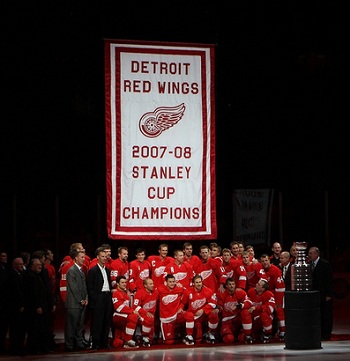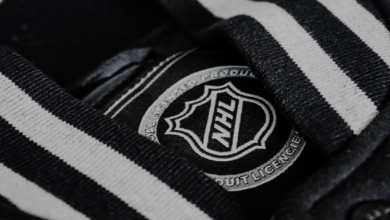Top 15 NHL Teams of All Time – #14

Continuing our countdown of the top 15 teams of all time, today we have #14, the 2007-2008 Detroit Red Wings. As a refresher, our stipulations for this countdown are:
1. The team must have won the Stanley Cup
2. We only looked at teams after the NHL expanded from just the Original Six (so since 1967-1968)
Today, we introduce you to the 2007-2008 Detroit Red Wings, an absolute machine of a team.

(Gregory Shamus/Getty Images)
In the 2006-2007 playoffs, the Wings season ended in the Western Conference Finals at the hands of the eventual Stanley Cup Champions, the Anaheim Ducks. Coming out of the lockout, many felt that this Wings team was too old to keep contending and many felt that the Wings falling to the much more physical Ducks was a sign that they could no longer compete at the highest level. Many felt that their passive, skill-heavy style could no longer compete with the bigger teams and that the Ducks were ushering in a new era where only the most physical teams could last to the very end. The Wings decided to get just a bit meaner in the offseason, adding veteran Dallas Drake and pugilist Aaron Downey. However, in keeping with Wings fashion, the Wings also added the small but highly skilled Brian Rafalski to complement Nicklas Lidstrom on the back end. Thus, the 2007-2008 team was set – for now.
The Wings had one of the more dominant regular seasons in recent years, going 54-21-7, good for 113 points. The Wings were 30-8-3 at the midway point of the season, causing many people to talk about the potential for the third 60 win team in NHL history (76-77 Canadiens, 95-96 Red Wings). The possibility was still there with the Wings sitting at 41-10-4 on February 5th. However, the Wings went on a 1-8-2 stretch in their next 11 games. In the midst of the slide, the Wings decided that they had to make a deadline deal to add some veteran depth on the back end. The Wings acquired Brad Stuart from the Kings for a 2nd round pick and a 4th round pick and the final piece of the Wings team was put in place. Led by Johan Franzen and his 13 goals in the month of March, the Wings turned around their season, going 12-3-1 in their final 16 games to clinch the President’s Trophy.
Statistically, this Wings team was dominant across the board. The Wings were 3rd in goals for with 3.13 and 1st in goals against, allowing just 2.24 goals/game. The Wings also had dominant special teams, converting with the man advantage 20.7% of the time (3rd), while killing off 84.0% of their penalties (8th). What really set this team apart from the rest was their strong even strength play. The Wings posted an excellent 1.43 even strength for/against ratio, which is the 14th best mark among the 43 teams we looked at. During the regular season, that was the best mark by a wide margin, with the Stars posting the 2nd best mark at 1.11. This Wings team also relied on balanced scoring, having 5 different players score 20 or more goals, led by Henrik Zetterberg with 43. Overall, this was a dominant team across the board and they were led by their all world captain Nicklas Lidstrom.
The talent level of this team across the board was unparalleled in the NHL that season. Up front, the Wings were led by their two premier two-way players, Pavel Datsyuk and Henrik Zetterberg. They got timely goal scoring from Johan Franzen and Dan Cleary. On the back end, the Wings were led by Mr. Norris, Nicklas Lidstrom and Brian Rafalski. With the arrival of Brad Stuart, the Wings were able to put together their bruising 2nd unit of Stuart and Niklas Kronwall. Finally in goal, the Wings relied on a tag-team unit, consisting of future Hall of Famers Dominik Hasek and Chris Osgood. But often, top level talent has to be paired with grittiness to win a Stanley Cup and the Wings would show their grittier side during the playoffs.
The Wings drew division rival Nashville in the first round, who went 3-3-2 against the Wings during the regular season. Detroit started fast, taking games 1 and 2 by a combined score of 7-3, and many were starting to pencil the Wings into the next round. However, Nashville clawed their way back, stealing game 3 from the Wings. The Wings led 3-2 with 4 minutes to go in Game 3 before the Predators netted 2 goals in 9 seconds to pump life back into their team. Game 4 saw Dominik Hasek struggle again, as the Predators chased Hasek from the goal in the 2nd period, forcing the Wings to replace him with Chris Osgood. The Predators went on to win Game 4 3-2, setting up the all important Game 5. Before Game 5, the questions remained as to whether or not the Wings would continue to ride Dominik Hasek who backstopped them to their last Stanley Cup in 2002, or would they turn to Chris Osgood, who took them to the promised land in 1998? The Wings turned to “Ozzie” and they never looked back. The Wings outplayed the Predators badly in Game 5, outshooting them 37-10 through 2 periods, but they only managed to beat rookie Dan Ellis just once. With under a minute remaining in the third period, Nashville managed to bang home a loose puck and tie the game at 1. Immediately all fans began to have visions back to the past few postseasons, when hot goaltenders such as J.S. Giguere and Miikka Kiprusoff managed to stymie the Wings. However, this postseason would be different. Just 1:48 into overtime, the Wings hottest player, Johan Franzen, managed to steal the puck and score on a breakaway to send the Wings back to Nashville with a 3-2 series lead. Game 6 was another tight game, until Nicklas Lidstrom opened the scoring with one of his “patented” center ice shots. The Wings went on to take Game 6 3-0 and they lived to fight another day against. Up next? The Colorado Avalanche.
While this was a different Avs team from the ones that the Wings tussled with in the late 90’s and early 2000’s, the name still resonated with Wings fans, and boy did Johan Franzen get the memo. The Wings absolutely annihilated the Avalanche, sweeping them 4-0, and outscoring them 21-9. But the real story in the series was the coming out party for Johan Franzen, which is what sets this Wings team apart. Many teams have one superstar, some even two. What Franzen did during the end of the 2007-2008 regular season and the 2008 playoff put the Red Wings in another class as he became a force to be reckoned with, giving the Wings 3 bonafide players. Franzen against the Avs recorded 9 goals by himself in just 4 games, setting the Red Wings playoff record for goals in a series. Franzen alone scored as many goals as the entire Avs team and established himself as one of the premier power forwards in the NHL. After dispatching the Avs 8-2 in Game 4, the Wings had a date set with another old Western Conference nemesis, the Dallas Stars.
Before you could blink, the Wings were up 3-0 in the series as they picked up right where they left off against the Avs. The Wings crushed the Stars, outscoring them 11-4 in the first three games, outshooting them 86-57, and totally outclassing them. The Wings were cruising, having won their last 8 games in a row by a combined score of 34-14. However, the Stars pushed back, fighting to win games 4 and 5 to put the pressure on Detroit heading back to Dallas for Game 6. The Wings settled for no nonsense in Game 6, jumping out to a 3-0 lead in the first period before coasting to a 4-1 win. The Wings were back in the Stanley Cup Finals for the first time since 2002 and awaiting them were the young, upstart Pittsburgh Penguins.
The 2008 Stanley Cup Finals proved to be one of the most enjoyable finals in recent years. We had the old guard vs. the young Penguins, led by their two all-world players Sidney Crosby, and Evgeni Malkin. However, like in the Wings previous series’, the Wings came out and sent a message to the Penguins in the first two games of the series. The Wings shutout the Penguins 4-0 in game 1, 3-0 in game 2, and it seemed as if the Wings had totally taken the wind out of the Penguins’ sails. The Wings absolutely outclassed the Pens in the first two games, outshooting them 70-43 and they got the Pens frustrated, as evidenced by the game misconducts taken by Gary Roberts and Maxime Talbot at the end of game 2. Entering Game 3, many looked for this dominant Red Wings to put the Pens away, but the Pens showed their pride in front of their home fans, taking game 3. However, just like it had been all season, the Wings went into machine mode, taking game 4 and putting the Pens on the brink. But once again, the Pens fought back. With the Wings just 35 seconds from the Stanley Cup, the Pens managed to tie the game, and then win the game in triple OT in one of the most exciting games of the past decade. Heading back to Pittsburgh, many felt that the Penguins had life again, but as I’ve said many times before, this Red Wings team was a machine that didn’t experience human emotions like fear, anxiety, or pressure. The Wings took a 3-1 lead in the third and withstood a furious Pens rally that saw them climb within and inch of tying the game to clinch their 11th Stanley Cup in franchise history. This was a team for the ages, with talent and grit at all positions and some incredible play from Chris Osgood throughout the postseason. Osgood often gets overlooked throughout history, but his 2008 postseason has to go down as one of the greatest performances ever by a goaltender. Osgood went 14-4, with a 1.55 GAA, .930 SV%, and 3 shutouts, including 2 in the Stanley Cup Finals. He gave up more than 2 goals just 5 times in his 18 starts and was truly dominant. From top to bottom, this team had it all, and thus, they have earned their place in the top 15 teams of all time.



